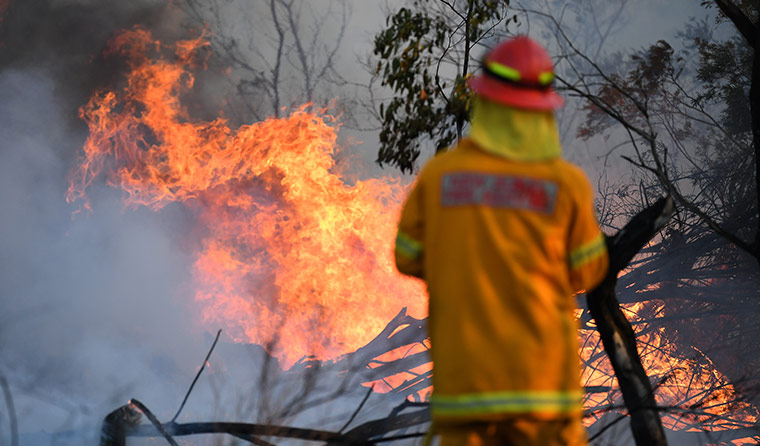News
How can GPs best prepare for bushfires in an ‘era of disasters’?
At a time when Australia is facing unprecedented levels of fire danger, GPs have a vital role to play during and after a disaster.
 Health risks from high levels of air pollutants are among the many flow-on effects of bushfires. (Image: AAP)
Health risks from high levels of air pollutants are among the many flow-on effects of bushfires. (Image: AAP)
New South Wales, Queensland, South Australia, Victoria, Tasmania, Western Australia.
It seems more than half of Australia is either on fire or high alert – and the summer has not even started.
The country is facing an ‘era of disasters’ that will see compounding impacts from increasing incidence of bushfires, floods and droughts.
So believes Dr Robert Glasser of the Australian Strategic Policy Insitute.
‘The scale of those impacts will be unprecedented, and the patterns the hazards take will change in ways that will be difficult to anticipate,’ Dr Glasser wrote.
This year’s bushfire season seems to underscore Dr Glasser’s prediction, starting well before the arrival of summer.
With so many bushfires either underway or yet to come, what can GPs do to help?
‘In the first few days, there’s a lot of care needed around managing chronic conditions,’ Dr Penny Burns, GP and disaster medicine specialist, previously told newsGP.
‘Those with chronic conditions need their medications and may have an increased risk of exacerbations or deterioration, so they need monitoring
‘This is especially true for those with hypertension and diabetes.’
GPs’ role on the frontline of disaster medicine will likely come into sharp relief as Australia endures the early start to bushfire season.
New South Wales had declared a seven-day state of emergency by mid-November, with the state’s fire chief predicting it would cover ‘the most dangerous bushfire week this nation has ever seen’. A week later, fire crews continued to battle multiple fires in which more than 600 homes had been destroyed and four people had lost their lives.
The extreme bushfire conditions across the state have even impacted its capital city, creating a strong haze of smoke over Sydney. The NSW Government has advised residents to remain inside as much as possible, as air quality has degenerated to hazardous levels.
Queensland has also been heavily impacted, declaring its own state of emergency in mid-November as dozens of blazes raged and evacuation orders were issued north of Toowoomba and on Moreton Island. Homes near Yeppoon were destroyed by a massive, multiple-fronted fire which authorities called ‘an unprecedented event’.
A day of record-breaking temperatures and windy conditions earlier this week caused multiple bushfires to break out in South Australia and the evacuation of an entire town on the York Peninsula.
Meanwhile, Victoria declared its first Code Red – the state’s highest bushfire warning – for almost a decade due to a combination of extreme heat and high winds.
Soaring temperatures have also seen Tasmanians told to prepare for dangerous fire conditions, and a catastrophic fire danger warning has been issued for the southern interior region of Western Australia.

Conditions at a blaze near Glen Innes, New South Wales, were last week described as ‘apocalyptic’. (Image: AAP)
Dr Glasser calls for the need to strengthen disaster response capacity and planning at all levels to meet the new level of threat.
Dr Burns believes all GPs could benefit from doing a quick planning session to identify the disasters most likely to hit their communities, and map out how they might best respond.
‘At times of such high stress, you don’t usually problem-solve as well. So one of the ways we can help is to plan and to prepare,’ she said. ‘That’s why sitting down and going through the process helps.
‘Now, say it’s 9.00 am with patients in the waiting room and I get the message a fire is coming and we need to evacuate. What would I do?
‘You just need to do this once – who you’d call, where you’d go, what would you do.’
The RACGP’s Emergency Response Planning Tool (ERPT) is designed to help general practices prepare for, respond to and recover from emergencies and pandemics.
Dr Burns said a rough plan on pen and paper is also worthwhile.
‘I spoke to a number of GPs after the 2011 Christchurch earthquake [in New Zealand]. Their recommendation was very strongly to sit down and do a quick and dirty one-page plan,’ she said.
‘They weren’t expecting that quake, but they had prepared for a SARS-like outbreak, and planning for that disaster built relationships with disaster response [personnel].
‘So when the quake struck, they were integrally involved.’
It is also common for other health events to strike disaster-affected communities.
‘Other things hit after the initial event. After the fire, there might be flooding or a downturn in local industry. After the 2009 Victorian bushfires, there was the swine flu pandemic,’ Dr Burns said.
‘As GPs, you’re an important medical member of your community, walking through the ups and downs with them.’
It remains to be seen how the rest of Australia’s bushfire season progresses, although former NSW fire commissioner Greg Mullins has made a grim prediction that the worst is yet to come, given that the nation has yet to enter the beginning of its traditional bushfire season.
But whatever the aftermath of this year’s bushfire season brings, Dr Burns believes GPs will be at the centre of helping their communities to heal and recover in the ‘long tail’ of the aftermath, which can bring with it conditions such as mental distress and illness and chronic disease.
‘GPs have a key role as a local, trusted health provider. When you’re in distress, people want to see a trusted face,’ she said.
Login below to join the conversation.
bushfire climate change disaster medicine drought
newsGP weekly poll
As a GP, do you use any resources or visit a healthcare professional to support your own mental health and wellbeing?